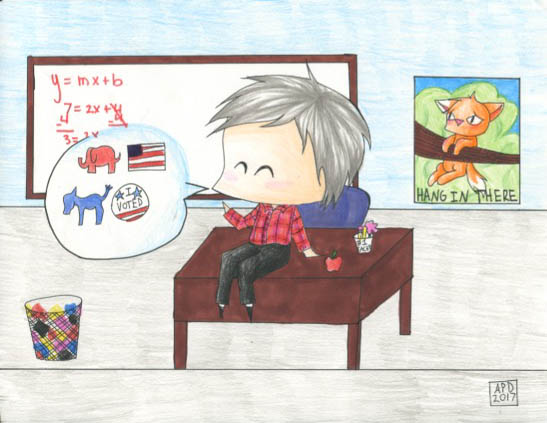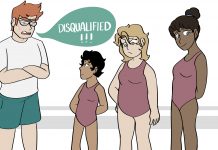By Ainsley Davis

Humans love to have opinions; it’s part of their very nature. In a society that enjoys controversy and scandal, political opinions are bound to come up in the classroom. While some teachers encourage kids to share their views in class, educators are usually steered away from expressing their personal politics.
According to ACLU, the legal rights of teachers vary depending on the school district. Although many schools have strict rules about what teachers can say, others have no stance on the issue and would technically allow an educator to express his or her feelings about yesterday’s political scandal if it’s relevant to the subject he or she is teaching. What teachers say in the classroom is considered speech on behalf of the school, and yet there aren’t any concrete laws instructing teachers on what is appropriate to discuss, so the issue relies on each district’s policies, which are often ignored or overlooked.
On one hand, high schoolers should be mature enough to handle touchy topics. If they listen to other viewpoints they can expand their knowledge of the world and develop empathy for people who are different from them. Scientific American says that simply interacting with a more diverse group- like those of a different religion, race, sexual orientation, or political ideology- improves creativity and ingenuity. By sharing their opinions in a respectful way, educators can also become positive role models, demonstrating the right way to express different beliefs while still respecting other points of view.
However teachers sharing their politics can often be misinterpreted by parents, who worry that teachers will feed their biases to students, rather than allowing them to form their own opinions. According to a study done by the deans of two major colleges, snide jokes about politics or partisan humor used by teachers is damaging and divides students further, creating an unfair atmosphere and an “in group” vs “out group” mentality. When teachers assert their own feelings, it adds to tension to the classroom, and it’s tricky to give each argument an equal weight when the top dog in the room- the teacher- has already taken a side.
Teachers should share their views when it is appropriate and contributes to the discussion. When talking about current events, for instance, students may be curious to hear their teacher’s perspective, especially if they respect the teacher. While blabbing on about his or her least favorite politician detracts from learning, if a teacher gently offers his or her opinion rather than asserting it as the only answer, students can understand opinions different from their own. As with many things in life, teachers sharing their political opinions requires balance and a respectful attitude toward each person’s unique beliefs and background.












What a talented artist
Well done Ainsley…it sounds like you have researched this topic at great length. That is wonderful to hear for many students, parents, voters and teachers do not go to great length’s to educate themselves, read from more than one source, listen intently to other’s before forming an opinion…..Your statements were well thought out, you are well informed and well read and you wrote so eloquently…..Kudo’s to you.
Great article Ainsley
Comments are closed.